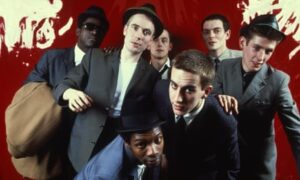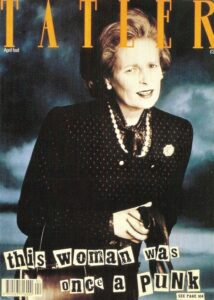Famous deaths, and how to use them in your lessons
During 2022, we lost a number of prominent public figures. While students are familiar with Pele and the Queen, below this top tier, many other famous deaths are reported by the news. Students are likely to have seen these deaths on the news, but may not realise their significance, or understand why some these people were famous in the first place. Placing these people in their historical context is a good way of bringing the current events into the classroom.
Of course, some historical figures are easier to integrate into lessons than others. In light of our recent programme on Margaret Thatcher, it is worth pointing out that two recent deaths were covered by the news with constant reference to Margaret Thatcher: Terry Hall of the Specials and Vivienne Westwood.
Terry Hall

Terry Hall’s obituary on BBC News explains that The Specials were “a multi-racial group, documenting the turbulent Thatcher years by playing songs directly indebted to Jamaican ska – a pre-reggae style that remained popular in Britain’s West Indian communities.”
We can see this in some of the band’s song lyrics, which can easily be used in the classroom as historical sources. For example, in ‘Doesn’t make it alright’ Hall sings that “Just because you’re a black boy/Just because you’re a white/It doesn’t mean you’ve got to hate him/It doesn’t mean you’ve got to fight”, reflecting the threat of racist violence in Thatcher’s Britain. Released in 1979, this came before the famous Brixton Riots of 1981 in which tension between the police and London’s black community boiled over.
On the same day that Hall’s died, BBC Nes also published an article about The Specials’ song “Ghost Town”, branding it ‘The song Margaret Thatcher wishes was never released’. The was released in the wake of the Brixton riots, and other similar riots breaking out across the UK. It has come to be regarded as one of the most succinct statements of the mass unemployment and deindustrialisation that took place under Thatcher:
This town is coming like a ghost town/All the clubs have been closed down…/Bands won’t play no more/Too much fighting on the dance floor/ Do you remember the good old days before the ghost town?… music played in a de boomtown/ Why must the youth fight against themselves?/ Government leaving the youth on the shelf/This place is coming like a ghost town/No job to be found in this country/Can’t go on no more/The people getting angry.
The BBC called the song “the perfect coming together of pop and politics at exactly the right moment in history”, while The Guardian subtitled Hall’s with a reference to this song: “Singer with the Specials whose chart-topping Ghost Town evoked the sense of social collapse gripping Britain at the turn of the 80s”. “Ghost Town” clearly deserves its place as a source to help students understand Thatcher’s Britain.
Find out how to use more songs when teaching Thatcher, along with our suggestions and explanations here.
Vivienne Westwood
Fashion designer Vivienne Westwood, who passed away on 29th December 2022, defined the look of the Sex Pistols, and so of British punk in general. While the punk movement began before Thatcher came to power – for example The Sex Pistols’ ‘God Save the Queen’ was released in 1977, two years before Thatcher was elected – punk music became synonymous with a hatred of Thatcher.

Westwood’s punk credentials were questioned as she became more popular, and one the most famous images of her commented on this, utilising the image of the then-Prime Minister, Margaret Thatcher.
This cover from Tatler magazine shows Westwood wearing a suit that Thatcher herself had ordered.
What can we learn from this as an historical source?
The juxtaposition of Thatcher and ‘this woman was once a punk’ shows that Thatcher was seen as the complete opposite of punk. Thatcher was the establishment while punk meant rebellion.
However, like Westwood and punk bands, Thatcher clearly had a strong sense of the importance of clothing and imagery. This image demonstrates that Thatcher’s look was iconic enough that simply dressing up in similar clothes and wearing the same hair style was instantly recognisable to people. In this sense, Thatcher herself was something of a fashion icon much like Westwood herself, albeit a less cool one. Thatcher’s keenness on projecting the correct image is also shown by the fact that she famously had elocution lessons to lower her voice to sound more authoritative.
Despite becoming wealthy and receiving a damehood from the Queen, both very un-punk things to do, Westwood remained a political activist throughout her life. She campaigned for green issues, nuclear disarmament and against fracking among many other causes. She never gave up her opposition to Thatcher’s politics. Speaking in 2011, she said that “Margaret Thatcher was a hypocrite…The Iron Lady is now a film. I don’t think it is going to show the real damage that she caused in the world. She helped to release financial madness and now the pyramid scheme has crashed…Thatcher got the North Sea oil bonanza and used the money to help business. If I had really been Thatcher I would have used this wealth to reduce the size of classes in school.” Whether she was still punk or not, Westwood maintained punk’s trademark antipathy towards Thatcher to the end – demonstrating the lasting imprint that Thatcher left on British culture.






